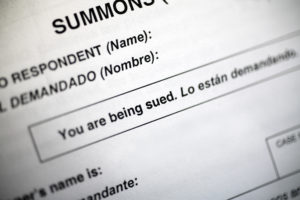
Perhaps the worst thing about having your car repossessed is that even after your vehicle is gone, the lender may not be done with you.
In some cases, lenders hire collectors or file lawsuits against borrowers to recoup what they’re owed. In this blog post, we’ll look at steps lenders may take after repossessing a car.
Why didn’t the sale of my car cover the balance owed on the loan?
After your vehicle is repossessed, the lender will most likely sell it at an auction or through a private sale. The lender will deduct the selling price of the car from the loan balance. However, when the proceeds from the sale do not cover the amount you still owe, the lender will contact you to collect it. This amount is known as a deficiency.
 Why am I being contacted by a debt collector?
Why am I being contacted by a debt collector?
The lender might choose to collect the balance from their internal collection department. But if they are not successful and the balance remains unpaid, a third-party collector, such as a collection agency or law firm collector, may be assigned to collect the debt. Collection calls are made to the borrower and collection letters are sent. Even when the lender is owed money, the debt collector must follow the law.
The Fair Debt Collection Practices Act (FDCPA) is a federal law that protects consumers from harassment and abusive behavior from debt collectors. If the collector violates the FDCPA, the consumer may pursue a lawsuit against the collector, whether or not the deficient balance is owed.
Why did I receive a summons to appear in court?
 Even though the vehicle was repossessed, the borrower still has an obligation to the lender to satisfy the loan balance. If attempts to collect the repossession deficiency have been unsuccessful, the lender may choose to file a lawsuit against the borrower. If you have been sued, do not ignore it. Disregarding a summons to appear in court could result in a default judgment being entered against you for the deficient balance. You may have a defense.
Even though the vehicle was repossessed, the borrower still has an obligation to the lender to satisfy the loan balance. If attempts to collect the repossession deficiency have been unsuccessful, the lender may choose to file a lawsuit against the borrower. If you have been sued, do not ignore it. Disregarding a summons to appear in court could result in a default judgment being entered against you for the deficient balance. You may have a defense.
Do I have any legal rights against the lender?
An experienced consumer lawyer will be able to determine whether your legal rights have been violated by the lender or debt collector, even if a lawsuit has been filed against you. There are some legal issues that you might want to explore.
1. Unlawful repossession
Did the repo agent breach the peace when repossessing the car?
Repossession agents may not use physical force, threaten to use force, or enter your property without permission.
2. Police Involvement
Did the police get involved or aid in the repossession?
Repossessions can become volatile. If the police are called, they are to help keep the peace and assist in diffusing any confrontation between the repo agent and the borrower. However, if the police threaten arrest or command the keys be turned over to the repo agent, they may have crossed the line from keeping the peace to breaching the peace, which could be a violation of the borrower’s constitutional rights.
3. Failure to send proper notices
Did the lender provide you with proper notices after the repossession?
The lender is to provide written notices to inform the borrower of options to get the vehicle back after repossession, and if the vehicle was sold, details of the selling price and any remaining balance owed on the loan. Read our earlier blog entry to learn more about these notices.
4. Failure to sell the car in a commercially reasonable way
Did the lender sell your vehicle at a commercially reasonable price?
Understandably, buyers at auctions or private sales want to purchase vehicles at a favorable price. But if your vehicle was sold at a price significantly less than its value, you may have an issue to bring against the lender.
5. Collectors may not threaten a lawsuit
Did the collector use abusive collection tactics to collect the deficient balance?
Debt collectors must follow the law and not use abusive practices to collect debts. If the amount of the debt is misrepresented or exaggerated, or a lawsuit is threatened when none is intended, there could be a violation of the consumer’s rights.
Seek legal help
Flitter Milz is a consumer protection law firm experienced in representing consumers who have suffered from vehicle repossession, abusive collection contact, judgments from auto loan deficiencies and credit reporting errors listed by auto lenders. Contact us for a free consultation and find out how we can help.








